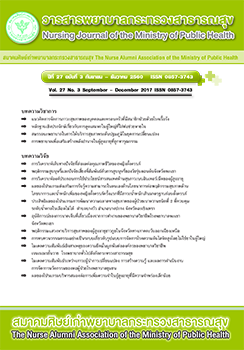The Effects of Brain Exercise Program on Memory Enhancement among the Elderly with Mild Cognitive Impairment
Main Article Content
Abstract
The objective of this Quasi-experimental research study was to examine the effect of brain exercise on memory enhancement in the elderly with mild cognitive impairment. Twenty two elderly with mild cognitive impairment who were residing at one village of Chainat Sub-district, Amphur Muang, Chainat Province in Thailand, satisfied the inclusion criteria of the experimental group were recruited. The selected participants participated in the Brain Exercise Program following the guidelines from the Ontario Nurses’ Association of Canada (Registered Nurses Association of Ontario) 2 days a week, continuously for 5 weeks. The evaluation instruments consisted of a Demographic Data Form and the Mini-Mental State Examination-Thai 2002. Data were analyzed using descriptive statistics and paired t-test.
The results of this study revealed that: the average memory scores of the Elderly with mild cognitive impairment after receiving the Brain Exercise Program were statistically and significantly higher than those of before receiving the Brain Exercise Program at a level of p <.01. The conclusion of this study could be used as a guideline for enhancing the memory retention of the elderly with mild cognitive impairment and preventing the deterioration of the brain.
Article Details
บทความและรายงานวิจัยในวารสารพยาบาลกระทรวงสาธารณสุข เป็นความคิดเห็นของ ผู้เขียน มิใช่ของคณะผู้จัดทำ และมิใช่ความรับผิดชอบของสมาคมศิษย์เก่าพยาบาลกระทรวงสาธารณสุข ซึ่งสามารถนำไปอ้างอิงได้
References
2. Prasartkul P. Situational of Thai elderly 2014. Bangkok: Amarin printing and Publishing; 2015.
3. Carvalho A, Rea IM, Parimon T, Cusack BJ. Physical activity and cognitive function in individuals over 60 years of age: a systematic review. Clinical Interventions in Aging 2014; 9: 661-682.
4. World Health Organization. Mental health and older adults [internet]. 2016 [cited 2016 November 14]. Available: http://www.who.int/mediacentre/factsheets/fs381/en/ Updated April 2016
5. Roberts RO, et al. Higher risk of progression to dementia in mild cognitive impairment cases who revert to normal. Neurology 2014; 82(4):317-325.
6. Lee SJ, Ritchie CS, Yaffe K, Stijacic CI, Barnes DE. A Clinical Index to Predict Progression from Mild Cognitive Impairment to Dementia Due to Alzheimer’s Disease. PLoS ONE 2014; 9(12):e113535. DOI: 10.1371/journal. pone.0113535
7. Montejo P, Montenegro M, Fernandez MA, Maestu F. Memory complaints in the elderly:quality of life and daily living activities. A population based study. Archives of Gerontology and Geriatrics 2012; 54(2): 298-304.
8. Alzheimer’s Disease International. Alzheimer Report 2015: The Global Impact of dementia: An analysis of prevalence, incidence, cost and trends. London: Alzheimer’s Disease International (ADI); 2015.
9. Noysipoom N, Sasat S. Living with Early-stage Dementia of Older Persons: A Qualitative
10. Case Study. Journal of Nursing Science Chulalongkorn University 2014; 26(2): 99-110. [in Thai].
11. Chaiwong P. Effects of Cognitive Training Program on Cognitive Abilities and Quality of Life in Elderly with Suspected Dementia [Master thesis]. Chiangmai: Chiangmai University. 2015. [in Thai].
12. Karuncharernpanit S. Older People with Dementia and Nursing Care: A Challenging Role for Nurses. Nursing Journal of The Ministry of Public Health 2015; 26(2): 99-110. [in Thai].
13. Gerhard WE, Thomas l, Stefan K, Michael H. New Development in the Diagnosis of Dementia. Physiology and Psychotherapy 2010; 21(2):202-205.
14. Sritonchai J. Effectiveness of Memory Training Program Implementation Among Elderly with Mild Cognitive Impairment, Pua District [Master thesis]. Chiangmai: Chiangmai University. 2015. [in Thai].
15. Registered Nurses Association of Ontario. Toolkit: Implementation of Best Practice Guidelines 2nd ed. [internet]. 2012 [cited 2016 November 14]. Available: http://www.rnao.com.
16. Atkinson RC, Shiffin RM. Psychology: Principles and application. 2nd ed. New Jersey: Prentice Hall; 1997.
17. Hontong R, Sasat S. The effect of Reminiscence Program on Cognitive Function of Older People with Dementia. Journal of Nursing and Education 2015; 8(1): 99-112.
18. Sornjiengkhum R. Effectiveness of Memory Training Program Implementation Among Elderly with Early-stage Dementia , Memory Clinic, Lampang Hospital [Master thesis]. Chiangmai: Chiangmai University. 2015. [in Thai].
19. Boripuntakul S, Kotan S, Methapatara P, Munkhetvit P, Sungkarat S. Short-term effects of cognitive training program for individuals with amnestic mild cognitive impairment: A Pilot Study. Physical & Occupational Therapy In Geriatrics 2012; 30(2): 138-149.
20. Woods B, Aguirre E, Spector AE, Orrell M. Cognitive stimulation to improve cognitive functioning in people with dementia [internet]. (2012). [cited 2016 November 14]. Available:http://www.thecochranelibrary.com/details/file/.../CD005562.html
21. Reijinder J, Heugten CV, Boxtel MV. Cognitive intervention in healthy older adults and people with mild cognitive impairment: A systematic review. Aging research reviews 2013; 12(2013): 263-275.

